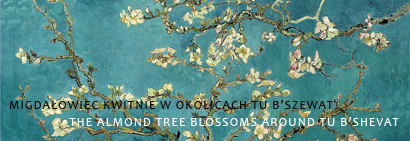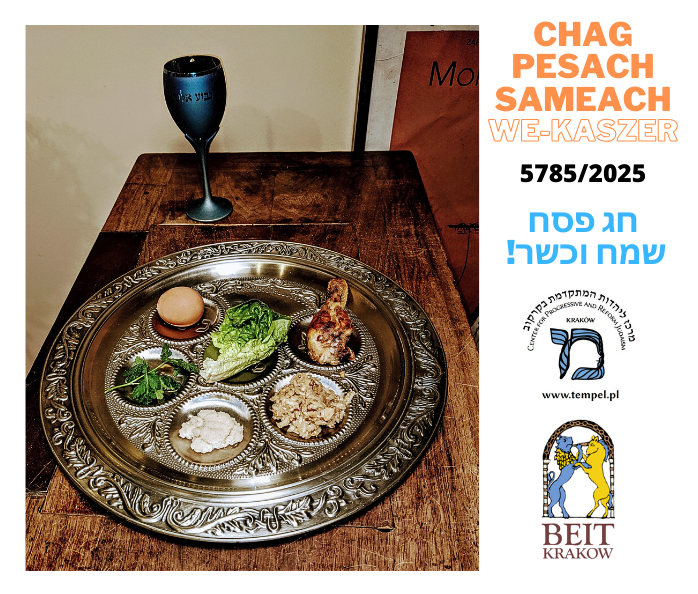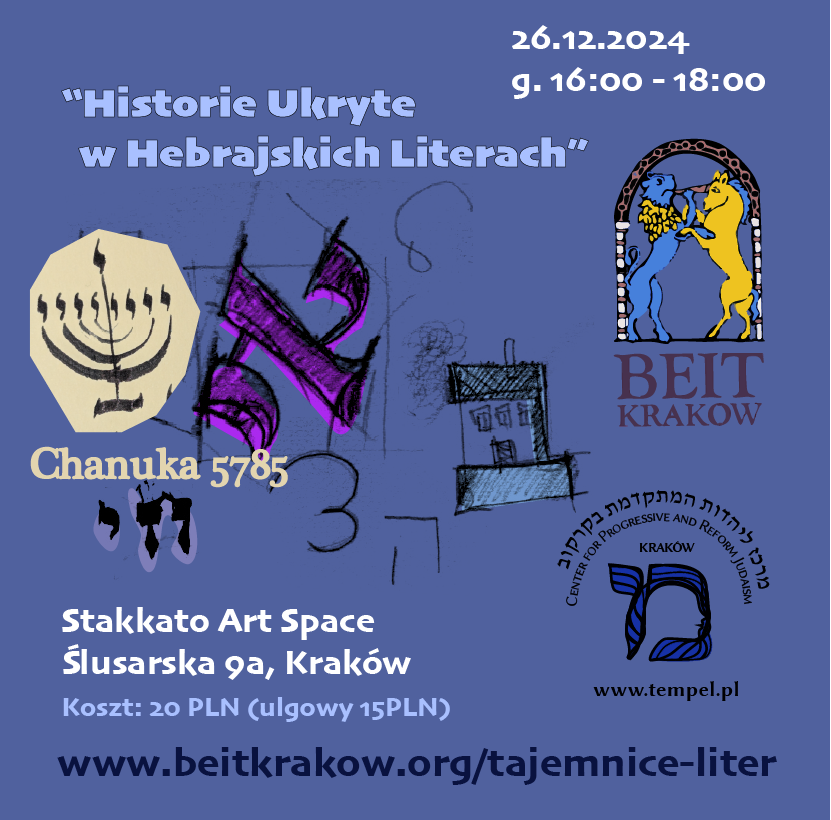[english below]
„Śnieg na moim mieście spoczywa jak talit (…)
Z ciepłych krajów tych, cóż przywiozłeś mi?
Śnieg na moim mieście, śnieg na mojej twarzy.
W owocach zamkniete są wszystkie moje tęsknoty.” ( Naomi Szemer, Szeleg al Iri )
Tu B’Szewat – piętnasty dzień hebrajskiego miesiąca Szewat – nierozerwalnie związany z ziemią Izraela.
Święto wypada w miesiącach zimowych – styczeń/luty. W Izraelu śnieg występuje wtedy bardzo rzadko, w Środku Europy praktycznie zawsze.
Znana pieśń „Śnieg na moim mieście” intensywnie i poetycko oddaje uczucia tęsknoty za domem i korzeniami.
Tradycja Sederu Tu B’Szewat pochodzi z XVI wieku, a jego twórcą jest rabin i kabalista Icchak Luria z Safed oraz jego liczni uczniowie. W XVI wieku kabalista rabin Icchak Luria z Safedu i jego uczniowie ustanowili seder Tu B’Szewat, w którym owoce i drzewa Kraju Izraela miały symboliczne znaczenie.
Tu B’Szewat – jeden z czterech nowych roków w kalendarzu żydowskim – festiwal drzew. W esencję święta wpisany jest też nierozerwalnie człowiek, gdyż „człowiekiem drzewo polne” (Dewrim 20:19) Poprzez dbałość o silne korzenie wydaje owoce.
Tematem, jak co roku nieodzownym, będą nawiązania do znaczeń owoców symbolizujących ziemię Izraela oraz człowieka: np. oliwek, daktyli, winogron, fig i granatów… Ich struktury, skórek, pestek oraz bogatej kabalistycznej symboliki w nich ukrytych.
W tym roku tradycyjny wieczorny Limud tekstów kabalistycznych nawiązać chcemy do wielowymiarowego i wieloznacznego współczesnego tekstu (dramatu Beniamina Bukowskiego) premierowego spektaklu naszego teatru – Teatru Żydowskiego w Krakowie – Teatru Midraszowego pod dyrekcją Raby Tanyi Segal, „Mazagan. Miasto”. Chcielibyśmy z perspektywy naszych tradycyjnych tekstów oraz „Mazagan. Miasto” spojrzeć na pojęcia dom, samotność, budowanie i odpowiedzialność za to, co z tego budowania powstaje.
„Snow in my city rests like talit (…)
From these warm countries, what did you bring me?
Snow in my city, snow on my face.
In the fruits, all my longings are closed.” (Naomi Shemer, Sheleg al Iri)
Tu B’Shevat – the fifteenth day of the Hebrew month of Shevat – inseparably connected with the land of Israel.
The holiday falls in the winter months – January / February. In Israel, snow occurs very rarely then, in the middle of Europe almost always.
The well-known song „Snow above my city” intensely and poetically reflects feelings of longing for home and roots.
The tradition of the Seder Tu B’Shevat comes from the 16th century and its creator is the rabbi and kabbalist Icchak Luria from Safed and his numerous students. In the sixteenth century, Kabbalist Rabbi Yitzhak Luria of Safed and his disciples established the Tu B’Shevat Seder, in which the fruits and trees of the Land of Israel had a symbolic and spiritual meanings.Tu B’Shevat – one of four New Year’s festivals in the Jewish calendar – a festival of trees. The essence of the holiday is also inscribed inextricably man, as written „Is the tree of the field a man…”(Devarim 20:19). He yields fruit through the care of strong roots.The theme, as every year indispensable, will be references to the meanings of fruits symbolizing the land of Israel and man: olives, dates, grapes, figs and pomegranates…, their structures, skins, pips and the rich kabbalistic symbolism hidden in them.
This year, we would like to refer the traditional evening Limud of Kabbalistic texts to a multidimensional and ambiguous contemporary text (written by Beniamin Bukowski) of the last premiere of the Jewish Theater in Krakow – the Midrash-Theater under the direction of Raba Tanya Segal, – „Mazagan. The city”.
We would like from the perspective of our traditional texts and the „Mazagan. The city” as well, to look at the concept of home, loneliness, building and responsibility for what arises from this construction.




